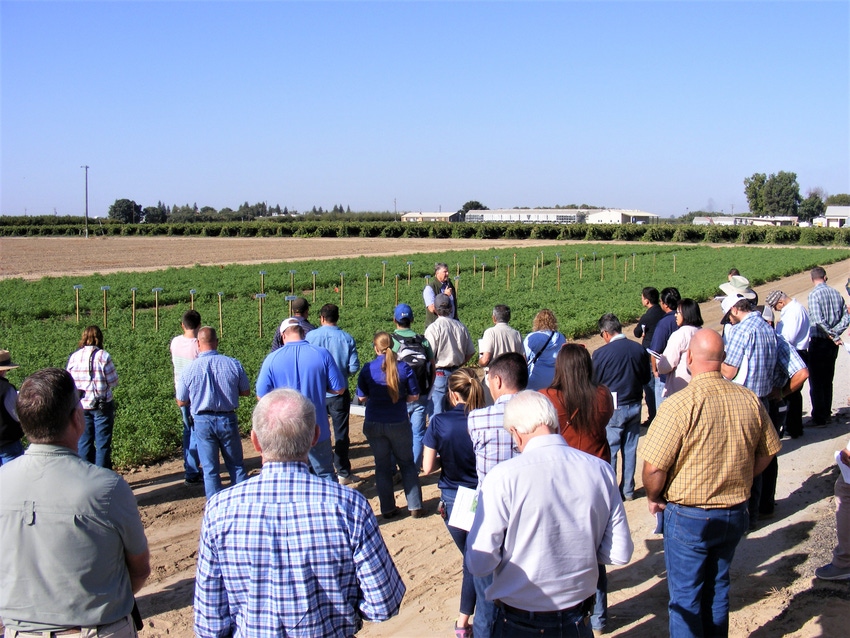
A new round of research into groundwater recharge in alfalfa fields is focusing on growing conditions in the southern San Joaquin Valley.
The University of California’s Kearney Agricultural Research and Extension Center in Parlier is the site of the latest trials using winter surface-water runoff to flood alfalfa fields.
A team led by University of California (UC) of Davis integrated hydrologic science professor Helen Dahlke is testing the effect of modest and high amounts of water application on growing-season alfalfa yield in different soils and under different climate conditions, Dahlke has said.
The recharge effort “has a lot of geographical significance” in the Tulare Lake Basin, where land subsidence because of excessive pumping is particularly severe, notes Nicholas Clark, a UC agronomy and nutrient management advisor for Kings, Tulare and Fresno counties.
The research is aimed at helping growers and water agencies “think about ways to use the landscape and manage water storage as we’re moving forward” with implementing California’s Sustainable Groundwater Management Act (SGMA), Clark says.
Groundwater recharge is one of many topics that will be covered in the UC’s annual alfalfa and forage field day Sept. 19 at the Kearney center. Other areas of discussion will include updates on timely research related to low-lignin alfalfa and alfalfa weevil management.
The field day will begin at 8 a.m. with a tram tour of several test plots, giving attendees an up-close look at projects examining alfalfa and sorghum drought stress and a sprayer-nozzle pattern and calibration demonstration. The tram will return at 10 a.m. for indoor talks, followed by lunch.
“One of the things we’re doing differently this year is we’ll have a lot more hands-on, interactive-type demonstrations,” Clark tells Western Farm Press. “That’s been something we’re really focusing on and trying to target, to have different learning modes other than just sitting in a classroom listening to talks.”
In another change, two of the presentations will be by video conference, enabling the center to “improve our content by not necessarily limiting speakers to those who can make driving arrangements,” Clark says.
Here are some of the key topics that will be covered by presenters.
GROUNDWATER RECHARGE
California’s groundwater reserves have been systematically depleted since the 1920s, but the notion of recharge really took hold in 2014 with the passage of SGMA, researchers say. Alfalfa fields, which go dormant during the winter in many areas, were identified as potential venues for intentional recharge.
A study published last year in the UC’s journal California Agriculture examined trials in fields near UC, Davis and at the Bryan-Morris Ranch in Etna, Calif., where grower Jim Morris has more than 300 acres in alfalfa and grass hay production. The study’s initial results found that alfalfa can tolerate very heavy winter flooding for groundwater recharge.
Dahlke’s team estimated that if all the state’s alfalfa acres with suitable soils were flooded with six feet of winter water, and assuming 90 percent percolates past the root zone, it would be possible to bank 1.6 million acre-feet of groundwater each year.
By comparison, Lake Oroville, the second-largest reservoir in the state, has a storage capacity of 3.5 million acre-feet, Dahlke wrote. An acre-foot is about 326,000 gallons, or enough water to serve an average California household for a year, according to the Water Education Foundation.
However, those fields were dormant at the time of flooding. The next step will be to use a field at Kearney and two commercial alfalfa fields to determine the effect of modest and high amounts of winter water application yields in places where the crop is grown but doesn’t go dormant.
Among the research will be to quantify how winter water applications affect growing-season water balance and irrigation demand, Dahlke has said. She will discuss the latest studies at the Kearney field day.
LOW-LIGNIN ALFALFA
When the USDA deregulated a new low-lignin alfalfa variety in late 2014, it offered what UC scientists think will be lots of promise for growers. The new variety, called KK179, was developed by Forage Genetics International, Monsanto and the Nobel Foundation. Some of the initial testing took place at UC, Davis and the UC’s Intermountain Research and Extension Center in Tulelake.
Lignin is a fibrous part of cell walls in plants, strengthening stems and helping the plant grow upright, the UC explains on its website. The problem is that its high concentration in alfalfa makes it nearly impossible for dairy cows and other ruminants to digest. The KK179 variety uses a modified gene from alfalfa itself, improving the crop’s quality and digestibility.
Because alfalfa growers have frequently cut early to obtain high quality but in turn lose yield, the new trait may enable growers to delay harvests for a few days, increasing yields and harvest flexibility while maintaining quality, UC agronomist Dan Putnam explained in a blog post.
The tram tour on Sept. 19 will begin with Putnam’s low-lignan alfalfa plots, where he’s testing his hypothesis.
ALFALFA WEEVIL
Scientists are still looking for answers as alfalfa weevil populations in recent years have developed pyrethroid resistance in some areas, including the Scott Valley.
In 2016, pyrethroid insecticides such as Warrior and Baythroid did not appear to give effective control over alfalfa weevils in fields treated multiple times, according to a UC Cooperative Extension blog post.
In a subsequent study, a team led by University of California Cooperative Extension farm advisor Rachael Long asserted there’s a need for identifying the specific weevil strains in a production area for improved management, developing and implementing economic threshold levels for better monitoring and spray timing, finding new insecticide chemistries, and developing alfalfa host plant resistance for weevil control.
Ian Grettenberger, a Cooperative Extension entomology specialist from UC, Davis, will present on work funded by the state Department of Pesticide Regulation to re-evaluate alfalfa weevil insecticide treatment thresholds, Clark says.
REGISTER ONLINE
To register for the field day online, visit https://bit.ly/2Mq9sNY.
About the Author(s)
You May Also Like






